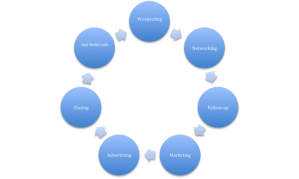
All networking groups are not created equal. I’m not saying that one is necessarily better than the others, but your expectations and the rules of engagement are different.
According to the Guru of Networking, Ivan Misner, Founder of Business Networking International (BNI), you should belong to at least three of the below seven different types of networking groups, but not more than one of the same type to maximize your exposure.
Let’s discuss the different types of networking groups, and who should and should not join the different types of groups.
Strong Contact Networking Groups
This type of networking group meets on a regular basis (usually every week). You will be meeting with the same people each week and there may be visitors from time to time. Attendance and the giving and receiving of referrals are strictly monitored. Also, when you are a member of this type of networking group, you will have exclusive dibs on your profession – there will be no one else from your profession allowed to join the group. Any and all referrals for whatever it is that you sell will be given to you. Examples of a strong contact network are Business Networking International (BNI); Le Tip; and Leads Club.
These networking groups tend to meet in the morning before the start of the business day – typically over breakfast. For instance, I am a member of a chapter of BNI and we meet at 7:00am every Tuesday morning.
Who should join? B2B sales agents, self-employed individuals, and small business owners.
Who should stay away? Network marketers who are looking to recruit.
Casual Contact Networking Groups
Your local chamber of commerce is a good example of this genre of networking group. These networking events are usually well attended, but there will be overlap amongst vocations. For instance, if you’re an insurance agent, you will most certainly bump into other insurance agents. The best way to get noticed in this type of networking group is to volunteer for a leadership roll. That way, you will stand out over your competitors. Chambers of commerce are also cool because they tend to have very good workshops.
Who should join? All sales agents, self-employed individuals, and small business owners
Who should stay away? N/A
Community Service Organizations
Rotary Club, Lions Club, Kiwanis, fraternities, sororities, community boards, environmental groups, civil rights / civil liberties groups, and houses of worship all fall under this umbrella. Everyone should join something that supports their community. As the saying goes, “The grass is not greener on the other side. The grass is greener where you water the grass!” Make sure to take care of home first. However, do understand that these organizations were formed for a specific cause – not for getting more customers for your business. However, once you get people to know you, like you, and trust you, you very well may end up doing business with them.
Who should join? Everyone – take care of home!
Who should stay away? Anyone looking to get quick customers. If you are found to be the proverbial wolf in sheep’s clothing, you’re finished.
Women’s Networking Organizations
These organizations are unique in that they tend to be combinations of two or more of the other kinds of groups. For instance, you have the National Association of Women’s Business Owners (NAWBO), but you also have Mothers Against Drunk Drivers (MADD). The first one is for business networking, but the latter is built around a social issue. Also, women’s groups do allow men to join. I myself am a member of the Manhattan Women’s Chamber of Commerce.
Who should join? Sales agents, business owners, freelancers, civic-minded individuals – anyone.
Who should stay away? Men who are looking for dates. Gents, the ladies will see that coming a mile away. You have been warned.
Cocktail Mixer Business Networking Events
These are probably the most prevalent among all networking groups. They are typically held in bars and restaurants, and are usually very well attended. I have met most of my contacts at these type of events. They are the quickest way to build your rolodex. However, only seasoned networkers can really flourish in this environment. More on that at a later date. One thing to be careful about is not to drink too much, and be advised that some will drink to much. Some come looking for a date, rather than seeking business opportunities. Please remember that.
Who should join? Everyone one.
Who should stay away? N/A, but be advised that loud music and alcohol will be two things that you’ll have to contend with.
Professional/Trade Organizations
If you’re serious about your particular profession, you probably should belong to a professional/trade organization. Examples are the Direct Selling Association (DSA), American Medical Association (AMA), National Association of Public Accountants (NAPA), National Court Reporters Association (NCRA), NY Bar Association, etc. Typically, there aren’t very many sales opportunities within a professional/trade organization, but there may be opportunities for joint venturing and/cross-selling.
Who should join? All professionals/tradespersons
Who shouldn’t join? Outsiders (to the profession/trade) looking for a quick sale.
Hybrid Networking Organizations
These are organizations that do not neatly fit into one category. Grassroots Business Network, fits into this category because we are a casual contact networking group, with strong contact network, and community service organization tendencies. Also, the workshops feature uniquely qualified experts in various industries (e.g. wellness, sales, marketing, tax planning, business development, among other topics). Another example of a hybrid networking organization is The Network Marketers Alliance. It is a professional trade organization. They are a casual contact network with very strong professional/trade organization, but it’s networking events tend to have strong contact networking tendencies.









 1. Be a card taker, not a card giver. You can have a fantastically successful network event or opportunity and not give out a single card.
1. Be a card taker, not a card giver. You can have a fantastically successful network event or opportunity and not give out a single card.
